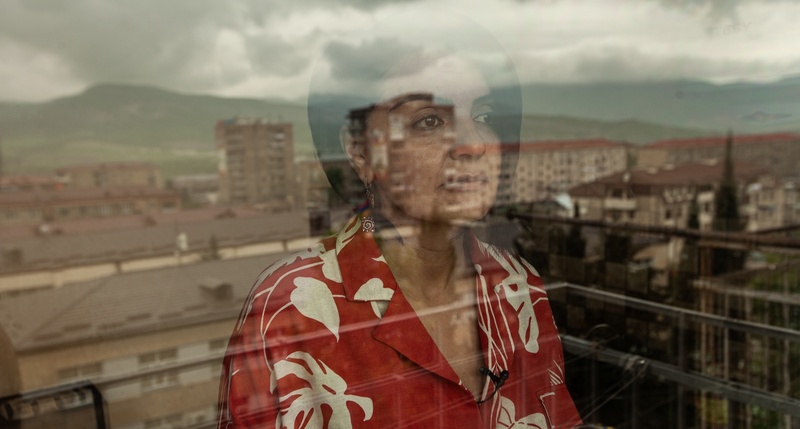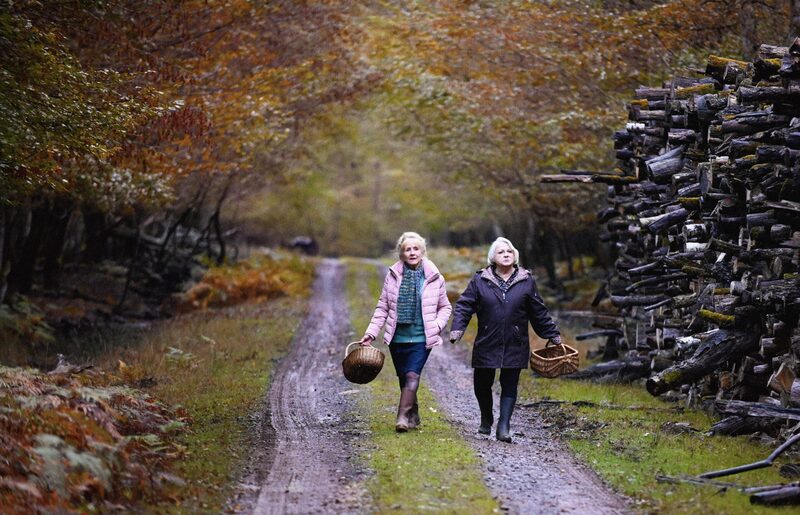
Resistance Written in Everyday Routines
MOVIE REVIEW
There Was, There Was Not
–
Genre: Documentary, War, Biography
Year Released: 2025
Runtime: 1h 35m
Director(s): Emily Mkrtichian
Where to Watch: in select theaters October 10, 2025
RAVING REVIEW: THERE WAS, THERE WAS NOT stands as both an act of storytelling and an act of preservation. Emily Mkrtichian’s debut feature documentary explores a homeland under siege and the women who endure within it, weaving myth and reality together until the line between the two becomes impossible to separate. By centering four Armenian women living in Artsakh, the film transforms geopolitical headlines into lived truths. A chronicle of resilience, weaving the fabric of a community through the daily acts of survival, work, and resistance.
The title itself nods to Armenian folklore, and Mkrtichian leans into that heritage by structuring the film as both story and testimony. At first, the women are captured in moments of dreams: a judo athlete with Olympic aspirations, a minesweeper dismantling the dangerous remnants of conflict, an activist fighting for women’s rights, and a political hopeful envisioning a future for her people. The framing here is lyrical, with serene imagery and moments of quiet optimism. But when war erupts again, the fragile progress in their lives is upended. Suddenly, the film pivots from possibility to loss, and the mythic quality hardens into testimony.
Mkrtichian shot the film over several years, which allows the transformation to be gradual and devastating. Early footage conveys the vulnerability of peace, but it’s only when conflict returns that the viewer fully grasps what is at stake. The immediacy of her cinematography—capturing dislocation, and the disruption of normalcy—gives the film urgency without descending into sensationalism. It honors the subjects not by framing them as victims but as agents navigating impossible choices. Each woman emerges as distinct, yet all are united by the reality of a homeland being erased around them.
The strength of the documentary lies in its ability to personalize displacement, rather than in a wide political analysis. Mkrtichian embeds the story in daily life, encompassing activities such as cooking, training, and organizing. When those routines are ruptured, the loss resonates on a human scale. The act of sweeping mines, for example, isn’t just about clearing danger; it’s about reclaiming a future that can no longer be guaranteed. The judo athlete’s teddy bear swapped for a weapon is not a piece of war propaganda—it is a tragic shorthand for innocence forcibly surrendered. These moments illustrate the cost of conflict in ways numbers or maps cannot.
Stylistically, the film strikes a balance between observation and poetic framing. Its images often feel artistic, capturing mountains and landscapes with reverence, even as they become contested and bombarded. That choice emphasizes the contradiction of beauty and violence coexisting in the same frame. The editing, guided by executive producer Alexandria Bombach, maintains a tempo that allows viewers to absorb these contrasts instead of being rushed through them. Sound design is equally careful, letting silences weigh heavily and foregrounding the voices of the women themselves.
The film resists the impulse to universalize its message. It is rooted in the specificity of Artsakh, yet its resonance is undeniably global. In an era where conflict displaces millions, these stories echo far beyond one territory. The voices here represent not only Armenians but also the countless others whose homes vanish without international headlines. Viewers unfamiliar with Artsakh’s history may find themselves wishing for more explicit context, particularly around the geopolitical dynamics at play. Mkrtichian makes a clear choice to prioritize lived experience over explanatory narration, and while that heightens emotion, it leaves gaps for audiences who enter without prior knowledge. The approach is consistent with the filmmaker’s intent: to treat these women as keepers of culture and memory, not just as footnotes in a war.
Performances—though this isn’t a narrative film—are in how the women present themselves to the camera. Siranush Sargsyan, running for city council, embodies determination even as politics collapses around her. Svetlana Harutunyan dismantles explosives with the calm of someone who has already given too much to war. Gayane Hambardzumyan channels her energy into community empowerment, refusing to yield to despair. Sosè Balasanyan’s arc from athlete to soldier is the most visibly wrenching, embodying the generational theft of innocence that war enacts. Each subject feels multidimensional, never reduced to a symbol alone.
THERE WAS, THERE WAS NOT is, in essence, a preservation of voices that might otherwise be silenced. It acknowledges the disappearance of a homeland not through statistics, but through faces, names, and routines that are interrupted. For viewers, the effect is sobering. The documentary doesn’t simply document loss; it insists on the act of remembering, of saying these women existed, their homes existed, and their dreams mattered. That insistence makes the film both deeply personal and politically urgent. Its impact is undeniable. It lingers because it doesn’t just show war; it shows life before, during, and after, making the erasure of Artsakh not just a tragedy of borders but a tragedy of humanity.
Please visit https://linktr.ee/overlyhonestr for more reviews.
You can follow me on Letterboxd, Instagram, Twitter, and YouTube. My social media accounts can also be found on most platforms by searching for 'Overly Honest Reviews'.
I’m always happy to hear from my readers; please don't hesitate to say hello or send me any questions about movies.
[photo courtesy of WATERMELON PICTURES, SUNCATCHER PRODUCTIONS]
DISCLAIMER:
At Overly Honest Movie Reviews, we value honesty and transparency. Occasionally, we receive complimentary items for review, including DVDs, Blu-rays, CDs, Vinyl Records, Books, and more. We assure you that these arrangements do not influence our reviews, as we are committed to providing unbiased and sincere evaluations. We aim to help you make informed entertainment choices regardless of our relationship with distributors or producers.
Amazon Affiliate Links:
Additionally, this site contains Amazon affiliate links. If you purchase through these links, we may receive a commission. This affiliate arrangement does not affect our commitment to honest reviews and helps support our site. We appreciate your trust and support in navigating these links.



Average Rating